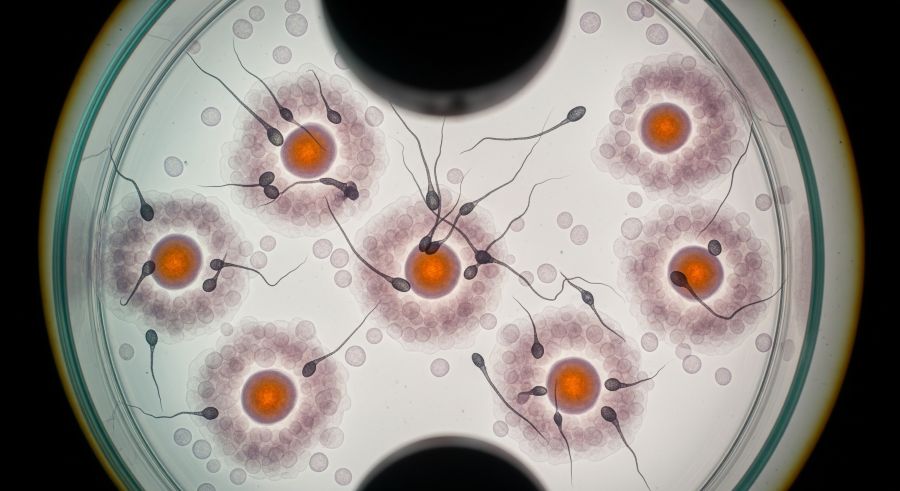If you're dealing with endometriosis and wondering about your fertility options, you're not alone. This condition affects millions of women worldwide, but with the right treatment approach, many still achieve their dream of becoming mothers. Let's explore how endometriosis impacts fertility and what solutions are available to help you on your journey.
Understanding Endometriosis and Its Impact on Fertility
Endometriosis occurs when tissue similar to your uterine lining grows outside the uterus. This tissue can attach to your ovaries, fallopian tubes, and other pelvic organs, causing inflammation, scarring, and pain. You might experience severe menstrual cramps, heavy bleeding, or pain during intercourse.
The connection between endometriosis and fertility challenges is significant. Studies show that 30-50% of women with endometriosis experience difficulty conceiving. The condition can affect your fertility in several ways, from blocking fallopian tubes to altering egg quality and creating an inflammatory environment that makes conception more difficult.
| Endometriosis Stage | Fertility Impact | Natural Conception Rate |
|---|---|---|
| Stage I (Minimal) | Slight reduction in fertility | 75-85% |
| Stage II (Mild) | Moderate impact on conception | 50-75% |
| Stage III (Moderate) | Significant fertility challenges | 25-50% |
| Stage IV (Severe) | Major impact on reproductive function | 5-25% |
Dr. Camran Nezhat, a leading endometriosis specialist, notes that "early diagnosis and appropriate treatment of endometriosis can significantly improve fertility outcomes and quality of life for women" (Nezhat et al., 2012). This emphasizes why seeking specialized care is crucial for your reproductive health.
How Endometriosis Affects Your Reproductive System
When endometriosis develops, it creates a cascade of effects throughout your reproductive system. The misplaced endometrial tissue responds to your monthly hormonal changes just like the tissue inside your uterus, but it has nowhere to go when it breaks down.
This process leads to inflammation and the formation of scar tissue, which can distort your pelvic anatomy. Your fallopian tubes might become blocked or damaged, preventing eggs from traveling to meet sperm. The inflammatory environment can also affect egg quality and make it harder for embryos to implant successfully.
| Reproductive Component | How Endometriosis Affects It | Impact on Conception |
|---|---|---|
| Ovaries | Cysts (endometriomas) can damage healthy tissue | Reduced egg quality and quantity |
| Fallopian Tubes | Scarring and blockages from adhesions | Prevents egg and sperm meeting |
| Uterine Environment | Inflammation affects implantation | Embryo attachment difficulties |
| Pelvic Cavity | Adhesions change organ positioning | Overall reproductive dysfunction |
The severity of your symptoms doesn't always correlate with the extent of endometriosis or its impact on fertility. Some women with minimal endometriosis struggle to conceive, while others with more advanced stages may conceive naturally. This is why personalized evaluation and treatment planning are essential.
Comprehensive Fertility Solutions for Endometriosis
At Avida Fertility, we understand that endometriosis affects each woman differently. Our approach combines advanced medical treatments with compassionate care to address your specific needs and maximize your chances of conception.
Medical Management Options
Your treatment journey might begin with medical management to control endometriosis symptoms and preserve fertility. Hormonal therapies can help suppress endometriosis growth, though they're typically used before attempting conception rather than during fertility treatments.
| Treatment Type | How It Works | Best For | Considerations |
|---|---|---|---|
| GnRH Agonists | Suppress estrogen production | Severe symptoms, pre-surgery | Temporary menopause-like effects |
| Progestins | Oppose estrogen effects | Pain management | May affect ovulation |
| Combined Oral Contraceptives | Regulate hormones | Symptom control | Prevent conception during use |
| Aromatase Inhibitors | Block estrogen synthesis | Resistant cases | Requires careful monitoring |
Surgical Interventions
When medical management isn't sufficient, surgical treatment can remove endometriosis lesions and restore normal pelvic anatomy. Laparoscopic surgery is the gold standard, offering minimal invasiveness with maximum precision.
Research by Dr. Paolo Vercellini demonstrates that "laparoscopic surgery for endometriosis can improve spontaneous pregnancy rates, particularly in women with moderate to severe disease" (Vercellini et al., 2014). This surgical approach can significantly enhance your fertility prospects.
Assisted Reproductive Technologies
When natural conception remains challenging after medical or surgical treatment, assisted reproductive technologies offer excellent success rates for women with endometriosis.
| Treatment | Success Rate with Endometriosis | Best Candidates | Key Benefits |
|---|---|---|---|
| IUI (Intrauterine Insemination) | 10-15% per cycle | Mild endometriosis, open tubes | Less invasive, lower cost |
| IVF (In Vitro Fertilization) | 35-45% per cycle | Moderate to severe cases | Bypasses tubal issues |
| IVF with ICSI | 40-50% per cycle | Male factor involvement | Enhanced fertilization |
| Donor Egg IVF | 55-65% per cycle | Severely compromised egg quality | Highest success rates |
At Avida Fertility, our comprehensive IVF process is tailored specifically for women with endometriosis. We use advanced protocols to optimize your response and maximize success rates while minimizing risks.
Optimizing Your Treatment Success
Your journey with endometriosis and fertility doesn't have to be overwhelming. There are several strategies you can implement alongside medical treatment to improve your outcomes and overall well-being.
Lifestyle Modifications That Make a Difference
While endometriosis is a medical condition requiring professional treatment, certain lifestyle changes can support your fertility and reduce symptoms. These modifications work best when combined with appropriate medical care.
| Lifestyle Factor | Recommended Changes | Potential Benefits |
|---|---|---|
| Diet | Anti-inflammatory foods, omega-3 fatty acids | Reduced inflammation, better hormone balance |
| Exercise | Regular moderate activity, yoga | Improved circulation, stress reduction |
| Stress Management | Meditation, counseling, support groups | Better hormonal regulation |
| Sleep Quality | 7-9 hours nightly, consistent schedule | Optimal hormone production |
Our comprehensive guide to lifestyle factors provides detailed information on how these changes can support your fertility journey.
Nutritional Support for Endometriosis
Proper nutrition plays a crucial role in managing endometriosis and supporting fertility. Certain nutrients have been shown to help reduce inflammation and support reproductive health.
Focus on incorporating fertility-boosting foods into your daily routine. These include leafy greens rich in folate, fatty fish high in omega-3s, and antioxidant-rich berries that help combat inflammation.
Advanced Treatment Protocols at Avida Fertility
At Avida Fertility, we've developed specialized protocols specifically designed for women with endometriosis. Our approach combines cutting-edge technology with personalized care to give you the best possible outcomes.
Personalized Ovarian Stimulation
Women with endometriosis often require modified stimulation protocols during IVF treatment. Our specialists carefully adjust medication dosages and timing based on your individual response and endometriosis severity.
We utilize advanced ovarian stimulation techniques that account for the unique challenges endometriosis presents. This includes careful monitoring of your response and adjusting protocols as needed to optimize egg quality and quantity.
Enhanced Laboratory Techniques
Our state-of-the-art laboratory employs advanced techniques specifically beneficial for patients with endometriosis. These include extended embryo culture, preimplantation genetic testing, and optimized culture conditions that support healthy embryo development.
| Laboratory Enhancement | Benefit for Endometriosis Patients | Success Rate Improvement |
|---|---|---|
| Extended Embryo Culture | Better embryo selection | 15-20% increase |
| PGT-A Testing | Identifies chromosomally normal embryos | 10-15% increase |
| Time-lapse Monitoring | Continuous embryo assessment | 8-12% increase |
| Optimized Culture Media | Supports embryo development | 5-10% increase |
Managing Expectations and Emotional Support
Dealing with endometriosis while trying to conceive can be emotionally challenging. It's normal to feel frustrated, anxious, or overwhelmed at times. Understanding what to expect during treatment can help you feel more prepared and confident.
Timeline Considerations
Your treatment timeline will depend on several factors, including the severity of your endometriosis, your age, and previous treatments. Some women conceive quickly after starting treatment, while others may need multiple cycles or different approaches.
It's important to remember that emotional support during fertility treatment is just as important as medical care. Our team includes counselors who specialize in fertility-related stress and can help you navigate this journey.
Building Your Support Network
Having a strong support system makes a significant difference in your treatment experience. This might include family, friends, support groups, or online communities of women facing similar challenges.
Success Stories and Hope
Many women with endometriosis successfully achieve pregnancy with appropriate treatment. The key is finding the right approach for your specific situation and working with a team that understands the complexities of endometriosis-related infertility.
At Avida Fertility, we've helped countless women with endometriosis build their families. Our comprehensive approach, combining medical expertise with emotional support, gives you the best chance of success while ensuring you feel cared for throughout your journey.
Frequently Asked Questions
Can I get pregnant naturally with endometriosis?
Yes, many women with endometriosis can conceive naturally, especially those with mild cases. However, it may take longer than average, and some women may need medical assistance. The key is early diagnosis and appropriate treatment.
Does endometriosis surgery improve fertility?
Laparoscopic surgery to remove endometriosis can improve fertility, particularly for women with moderate to severe disease. Studies show increased pregnancy rates after surgical treatment, especially when combined with fertility treatments if needed.
How does endometriosis affect IVF success rates?
While endometriosis can slightly reduce IVF success rates compared to other causes of infertility, success rates remain good, typically ranging from 35-45% per cycle depending on age and severity. Our specialized protocols help optimize outcomes.
Should I have surgery before trying IVF?
This depends on your specific situation. Surgery may be recommended if you have large endometriomas, severe adhesions, or if previous IVF cycles have failed. Your fertility specialist will help determine the best approach for you.
How long should I try to conceive naturally with endometriosis?
If you're under 35 with mild endometriosis, you might try for 6-12 months. If you're over 35 or have moderate to severe endometriosis, consider seeking help after 3-6 months of trying. Early intervention often leads to better outcomes.
Understanding your options and working with experienced specialists gives you the best chance of achieving your dream of parenthood. With advances in fertility treatment and our personalized approach at Avida Fertility, endometriosis doesn't have to prevent you from building your family.
Considering fertility treatment for endometriosis? Avida Fertility is here to support and guide you on your fertility journey. Our specialized team understands the unique challenges endometriosis presents and has the expertise to help you overcome them. Reach out today for a personalized consultation and take the first step towards building your family with confidence.






.png)







.svg)
.svg)
